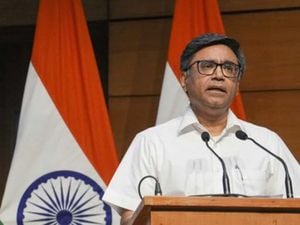On May 7, 2025, newly confirmed German Chancellor Friedrich Merz arrived in Warsaw with the aim of strengthening relations between Germany and Poland, two significant players in Europe. Merz emphasized the importance of a robust German-Polish relationship, stating that it would fortify the European Union as a whole. His visit comes at a time when the two nations face unresolved issues, including Poland's demands for reparations related to World War II and differing perspectives on Russia.
During his visit, Merz assured that the recent order by German Interior Minister Dobrindt to reject asylum seekers at German borders would be executed in a manner acceptable to neighboring countries. "We want to work together with Poland on a European solution to the issue of asylum seekers," he stated, highlighting a collaborative approach to migration challenges that both nations face.
Polish Prime Minister Donald Tusk echoed Merz's sentiments, asserting that every country has the right to protect its territory. However, he expressed concerns about maintaining the Schengen Agreement, emphasizing that migration is a European problem that requires collective action to secure the continent's external borders.
Both leaders also reaffirmed their commitment to supporting Ukraine in its ongoing defense against Russian aggression, with Merz identifying Russian President Vladimir Putin as the primary threat to European security. This shared stance marks a pivotal moment in the context of European unity and defense.
Merz's visit is seen as a potential turning point for German-Polish relations, which have been strained in recent years. According to Piotr Buras, head of the Warsaw office of the European Council on Foreign Relations (ECFR), there is a unique opportunity to resolve longstanding discord now that Merz is in power and the Polish presidential elections are approaching. "If Merz is in power and the Polish presidential elections are completed, there is a chance to address these issues," Buras noted.
Excitement in Warsaw is palpable, especially given the previously frosty relations between Tusk and former Chancellor Olaf Scholz. Merz was celebrated as a head of state during his earlier visit in February, prior to his confirmation as chancellor. He has committed to pursuing a German-Polish friendship treaty by June next year, a move that reflects his proactive approach to diplomacy.
In a parallel development, Tusk is expected to sign a similar treaty with French President Emmanuel Macron on May 9, 2025, signaling a strengthening of ties between Poland and France. This comes at a time when Warsaw has been working to align more closely with Paris while Berlin has seemingly taken a backseat in European policy discussions.
Poland hopes that Merz's leadership will invigorate defense efforts in Eastern Europe. The new chancellor has promised a more assertive policy regarding Ukraine and significant new investments in defense capabilities. Buras pointed out that while Merz may be hesitant to discuss large projects, building a European defense capability and deterring Russian aggression will be crucial tests of his leadership.
As Merz and Tusk work to mend their nations' relationship, they will likely confront historical grievances and political challenges. During his first term as Prime Minister from 2007 to 2014, Tusk was often criticized for being too close to Germany. With the first round of the Polish presidential elections approaching on May 18, Tusk may avoid public appearances that could jeopardize his ally Rafał Trzaskowski's chances.
Moreover, Merz is expected to take Poland's long-standing demands for a Berlin memorial honoring Polish victims of Nazism seriously, as well as resume discussions on war reparations. However, he may face resistance from the Social Democratic Party (SPD), as many in Warsaw remain skeptical of the SPD's commitment to Ukraine, particularly after Scholz's perceived lukewarm support and former Chancellor Gerhard Schröder's ties to the Nord Stream pipelines.
As the two leaders navigate these complex issues, their ability to foster a renewed partnership will be critical not only for Germany and Poland but also for the future of the European Union. The stakes are high, and the world will be watching closely as they attempt to overcome the shadows of the past and build a collaborative future.



